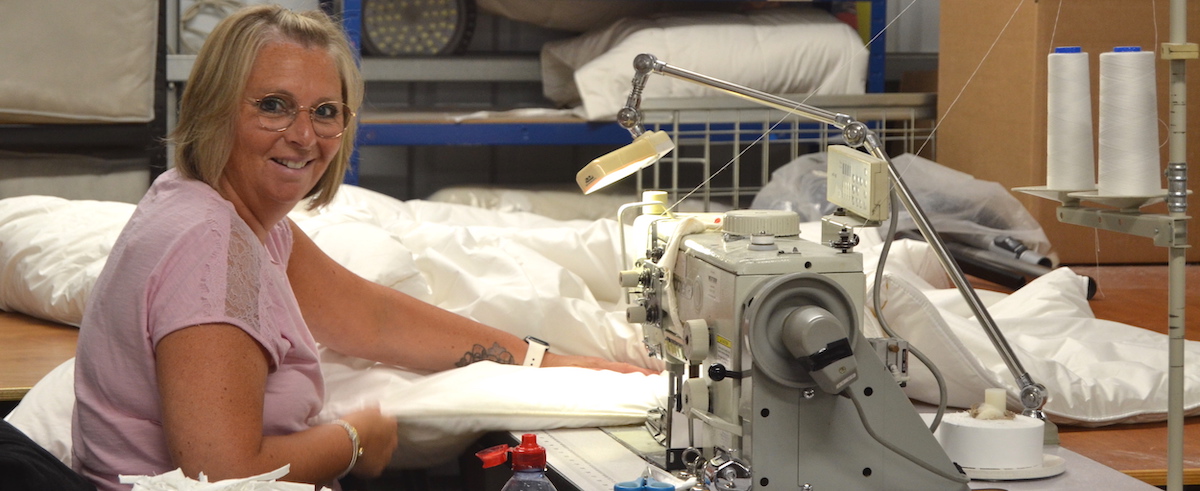A guide to help improve your sleep in 2024...and beyond

Would you say that your sleep factor is less than 8 out of 10? Whilst we all have the occasional sleepless night, if your sleep factor is consistently rating low, then now is the ideal time to see what you can do to improve the quality of your sleep.
It helps to think of your sleep by way of the acronym BED, which stands for ‘Behaviour’, ‘Environment’ and ‘Diet’. If going to and staying asleep is going to require a bit more adjustment, then read our blog for some tips and guidance.
What helps to combat insomnia?
- Cosy bedroom: Create the right kind of sleep environment with calming colours and natural bedding (more on this later in the blog!). Stop using devices at least 30 minutes before bedtime, as their blue light interferes with the production of the ‘sleep hormone’ melatonin. Also try to keep TVs out of the bedroom as these are also a distraction to settling down to sleep. The optimum bedroom temperature for sleep is around 18c degrees.
- Balanced diet: This is an important factor in helping to achieve healthier sleep. Try to eat a healthy, balanced diet including complex carbohydrates (such as the wholewheat varieties of bread and pasta), proteins, lots of fruit and vegetables, together with some healthy (unsaturated fats) and vitamins. Avoid overly rich, sugary or greasy foods prior to bedtime. If you feel hungry near bedtime, opt for low fat dairy products (skimmed milk and ‘live’ yoghurt), which contain magnesium, calcium and tryptophan, all of which are needed for the production of melatonin. Other foods that contain tryptophan include turkey, bananas, oats and honey.
- No napping: If possible, try to avoid napping during the day so that you are feeling more tired before bedtime.
- Cut down on caffeine: Drinks that include caffeine are coffee, tea, hot chocolate, energy drinks and many soft carbonated drinks.
- Avoid alcohol close to bedtime: Although alcohol may make you feel sleepy, it does interfere with our natural sleep cycles throughout the night, including our deep sleep cycle. This means you can wake up more often during the night, leading to fatigue in the morning.
- Soak and relax: A warm bath about 30 minutes before bedtime will help, as your body will then start to cool afterwards, triggering the body to start ‘sleep mode’. Try adding magnesium salts as this helps to relax muscles.


What can I do help fight fatigue?
With the everyday stresses of work and life, we can all sometimes feel drained and tired – but there are some steps you can take to help.
- Cut down on foods with high sugar content: Sugary food and drinks can create a sudden energy boost but will also generate an energy crash as your blood sugars spike and then drop. These spikes and drops can also impact on the quality of your sleep. Try eating more high-fibre foods that balances your blood sugar, releasing energy more slowly. For more information, read our previous blog on blood sugars.
- Top up on fluids: Dehydration will make you feel tired, so make sure you drink plenty of water every day – as a guide this should be approximately 2 litres. Small amounts of caffeine reduce the perception of fatigue but too much will disrupt your sleep. For more information read our previous blog about caffeine.
- Take time out to relax: Treat yourself to a massage, a soak in a bath with aromatherapy oils or sit quietly listening to music or reading a good book.
- Step out: Ensuring you take a little exercise every day will help towards dealing with fatigue. Take a gentle stroll out in the fresh air, or a quick brisk walk if you are able to. Consider joining a yoga class or try swimming a couple of days a week. Activities such as gardening count as exercise too!
3 tips to help get ready for sleep
- Start to relax one hour before your planned bedtime: Activities that will help to drop your heart rate and core body temperature will help you to fall asleep. For the latter, a warm bath or shower will raise your body temperature slightly and then it will slowly start to drop afterwards. This ‘cooling off’ is a signal to your body to get ready for sleep.
- Switch off the TV and put away your devices: Think about what you watch at night, perhaps watch something funny rather than high drama or action thrillers. Then switch off at least 30 minutes before bedtime. The same applies to devices…scrolling through social media raises your heart rate so does the opposite of helping you to relax! The blue light emitted also interferes with your body trying to prepare for sleep.
- Make sure you are ready for bed: We all do it…we start to feel sleepy on the sofa and so make the decision to go to bed. Then we start doing late night chores, such as emptying the dishwasher, putting the dog out for that ‘last thing at night’ bladder relief, taking off make up etc…We then get into bed thinking we’re ready for sleep, but all those activities have just told our brain that we want to be awake. So, it’s best to get all these things done before your pop on your PJs and then start winding down.
What kind of bedding helps achieve a more peaceful slumber?
Bedding that is breathable and temperature regulating will help you to achieve a more restful sleep. Most duvets, especially those made with synthetic fillings and/or polycotton fabric casings will not be breathable and can trap heat. This may seem like a good thing in the colder months, but most of us experience temperature fluctuations at night, and so having a duvet that can work more efficiently helps to alleviate the tiredness caused by continuously waking up feeling too hot or cold. Wool is a wonderful fibre that is breathable, temperature regulating and dust mite resistant. Natural wool has the ability to work with your core body temperature to help keep it balanced, retaining heat when you need it but also releasing it when you need to cool down.


Devon Duvets…luxurious and individually handcrafted with love
Our gorgeous wool bedding is made with fully traceable 100% British wool that is gathered from our selected group of farmers in Devon and the Southwest. The wool is then washed, without the use of chemicals, and gently needled to create soft fluffy layers. We encase these layers in a high quality 100% cotton casing. Each duvet, topper and pillow is individually handcrafted by our team of professional seamstresses, here in our Devon workshops. What's more...our duvets are specifically designed and crafted to drape around you, leaving you feeling cosy, comfy and cossetted.
For further information or if you would like guidance on which of our products might be suitable for your needs, do get in touch with the team who will be happy to help.
Always seek the advice of a medical professional if you continue to have serious sleep issues.


